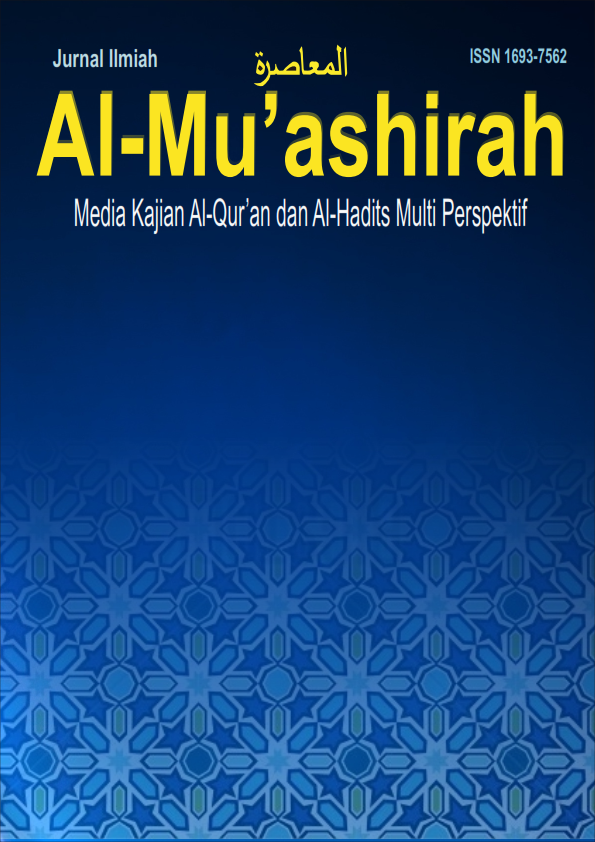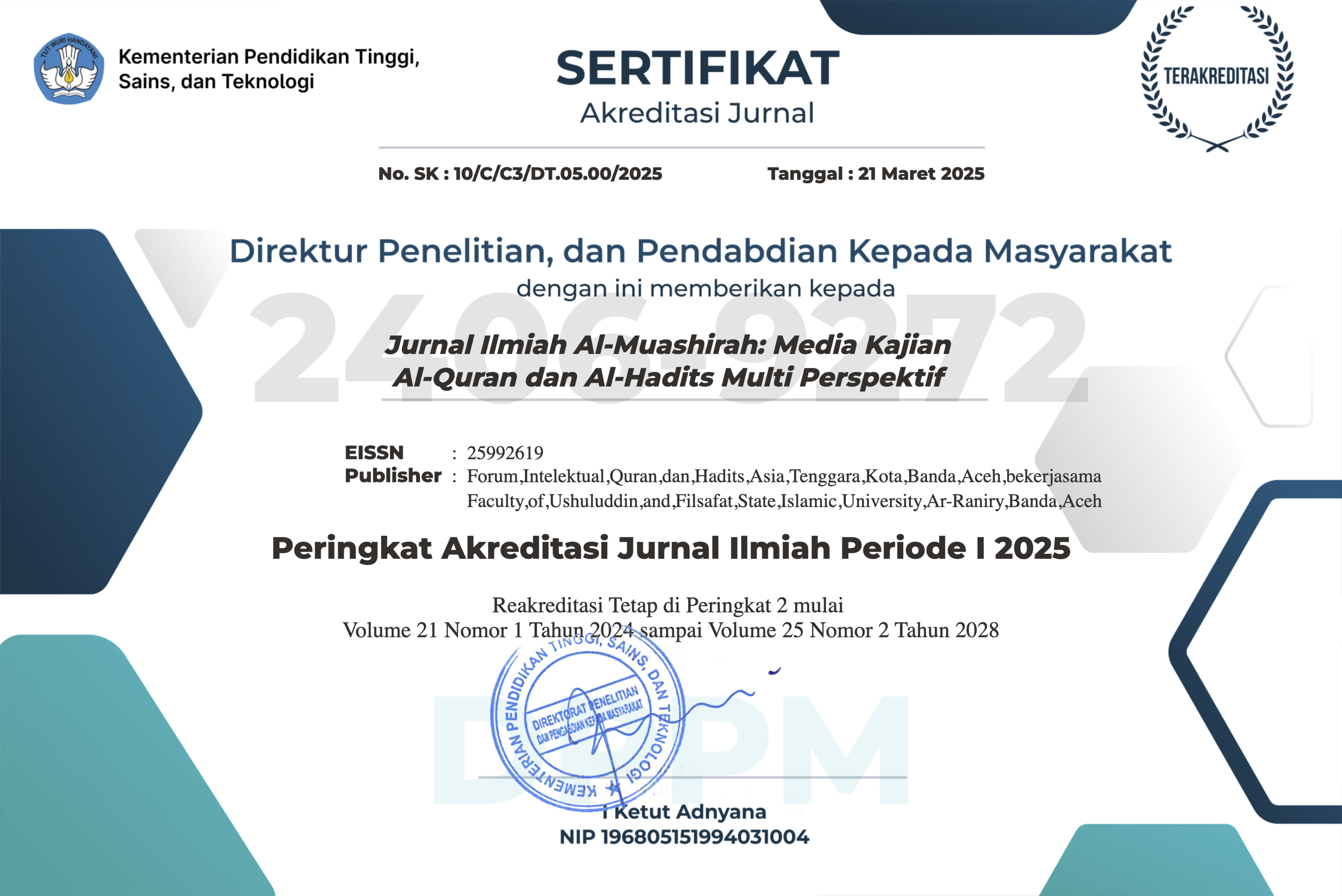A Hadith-Based Love Curriculum in Islamic Education: An Initiative by Indonesia’s Ministry of Religious Affairs
DOI:
https://doi.org/10.22373/jim.v22i2.30928Keywords:
Love Curriculum, Prophetic Hadith, Islamic Education, Inclusive Patriotism, Theological RecontextualizationAbstract
This study examines the concept of the “Love-based Curriculum” initiated by the Ministry of Religious Affairs of the Republic of Indonesia through the perspective of the prophetic hadiths of the Prophet Muhammad (PBUH). The research focuses on identifying, classifying, and analyzing hadiths that represent the values of love for God (ḥablum minallāh), love for fellow human beings (ḥablum minannās), love for the environment, and love for the homeland. Employing a qualitative approach through a library-based study, this research applies the method of takhrīj al-ḥadīth, followed by sanad and matan criticism to assess the authenticity of the hadiths utilized. This study is conducted to address the existing gap in the development of Islamic education curricula that explicitly draw upon prophetic traditions as primary sources of educational values. The findings reveal that out of 54 identified hadith, the majority are classified as ṣaḥīḥ (authentic) and are appropriate to serve as normative foundations for formulating a value-based curriculum centered on love. These traditions demonstrate a strong correlation with the values of tolerance, empathy, ecological responsibility, and national spirit. The results underscore the urgency of integrating prophetic teachings into the design of an Islamic education curriculum that is more holistic, transformative, and humanistic. A hadith-based Love Curriculum holds substantial potential in shaping a learning ecosystem that not only fosters intellectual excellence but also cultivates moral integrity, strengthens social harmony, and promotes the development of a robust national character.
Downloads
References
Ahmad, Aminudin Basir @, Mohamad Sabri Haron, Zulkifli Mohamad, Hamdzun Haron, Azizi Umar, Azizah Ya’acob, and others, ‘Pedagogy in Life-Long Learning in the Perspective of Islam’, Academic Journal of Interdisciplinary Studies, 2015. https://doi.org/10.5901/mjss.2015.v4n1p51.
Al-Marrani, Abdul-Jabbar bin Hadi bin Abdullah, ‘Types of Hadiths That Have Been Weak by Hadith Scholars in Terms of the Authenticity of the Chain of Transmission and the Correctness of the Meaning’, International Journal of Religion, 5 (2024), p. 474–500. https://doi.org/10.61707/yykf0g32.
Ali, Dr. Muhamed, and Dr. Muaz Agushi, ‘Eco-Islam: Integrating Islamic Ethics into Environmental Policy for Sustainable Living’, International Journal of Religion, 5 (2024), p. 949–57. https://doi.org/10.61707/gq0we205.
Alsaied, Mohamad Abdullah, and Mariam Almansori, ‘The Common Humanity in Ancient World Religions: An Analytical Study in Building Bridges of Understanding between Civilizations a Case Study of Western Asia’, Journal of Posthumanism, 5 (2025). https://doi.org/10.63332/joph.v5i2.421.
Anambas, Kemenag, ‘Kurikulum Cinta’, Anambas, Kemenag, 2025. https://kemenaganambas.id/detail/kurikulum-cinta.
Bègue, Laurent, ‘Beliefs in Justice and Faith in People: Just World, Religiosity and Interpersonal Trust’, Personality and Individual Differences, 32 (2002), p. 375–82. https://doi.org/10.1016/S0191-8869(00)00224-5.
Brifkani, Isra, ‘Whole Child Education in the Context of Islamic Schools in the United States: Principals’ Perspectives’, Religious Education, 116 (2021), p. 116–28. https://doi.org/10.1080/00344087.2021.1872004.
Burns, James P., ‘The Tyler Rationale: A Reappraisal and Rereading’, PROSPECTS, 54 (2024), p. 121–35. https://doi.org/10.1007/s11125-023-09643-y.
Cash, Emily M. H., ‘Clinging in Love: Attachment Indicators and Implications in Deuteronomy 10.12–11.1’, Journal for the Study of the Old Testament, 49 (2025), p. 407–34. https://doi.org/10.1177/03090892241308264.
Center, Yunandra, ‘Strategi Implementasi Kurikulum Cinta Dirjen Pendidikan Islam’, Yunandra Center, 2025.
El-Wakil, Ahmed, ‘“Whoever Harms a Dhimmī I Shall Be His Foe on the Day of Judgment”: An Investigation into an Authentic Prophetic Tradition and Its Origins from the Covenants’, Religions, 10 (2019), p. 516. https://doi.org/10.3390/rel10090516.
Fatmal, Abd. Bashir, Arifuddin Ahmad, and La Ode Ismail Ahmad, ‘Book Studies And Methods Of Understanding Hadith At The DDI Mangkoso Islamic Boarding School’, Ikhtisar: Jurnal Pengetahuan Islam, 4 (2024). https://doi.org/https://doi.org/10.55062//IJPI.2024.v4i1/483/5.
Firmansyah, Eka, and Khozin Khozin, ‘Teologi Dan Filsafat Sebagai Basis Pengembangan Kurikulum Pendidikan Agama Islam’, Research and Development Journal of Education, 8 (2022), p. 546. https://doi.org/10.30998/rdje.v8i2.13172.
H. Masnun, ‘Kurikulum Berbasis Cinta Dalam Spirit Ramadan’, Kementerian Agama Republik Indonesia, 2025. https://kemenag.go.id/opini/kurikulum-berbasis-cinta-dalam-spirit-ramadan-Rj452.
‘HaditsSoft’
Ida Rofi’Unnur Rodiah, and Anas Tania Januari, ‘Penguatan Moderasi Beragama Melalui Pembinaan Kesadaran Beragama Di MA Integratif NU Al-Hikmah Jeru Tumpang’, Journal Islamic Studies, 6 (2025), p. 96–106. https://doi.org/10.32478/4ewetz17.
Imad, Mays, ‘Love Matters: Embracing Love as the Heart of Higher Education’, Frontiers in Education, 9 (2024). https://doi.org/10.3389/feduc.2024.1286113.
Jong, Abbas, ‘The Post-Secular Cosmopolitanization of Religion’, Religions, 16 (2025), p. 334. https://doi.org/10.3390/rel16030334.
Kaunda, Chammah J., and Cyril Emeka Ejike, ‘Reconstructing Love for God Vis-à-Vis Religious Intolerance in Nigeria through the Philosophy of Samae Spirit’, International Journal of Public Theology, 18 (2024), p. 29–42. https://doi.org/10.1163/15697320-20240114.
Kaya, Suat, ‘From Needs Analysis to Development of a Vocational English Language Curriculum: A Practical Guide for Practitioners’, Journal of Pedagogical Research, 5 (2021), p. 154–71. https://doi.org/10.33902/JPR.2021167471.
KBR, ‘Catatan Hasil Pengawasan KPAI 2022: Pengasuhan Positif Dan Anak Indonesia Terbebas Dari Kekerasan’, KBR, 2023. https://kbr.id/articles/indeks/catatan-hasil-pengawasan-kpai-2022-pengasuhan-positif-dan-anak-indonesia-terbebas-dari-kekerasan.
Kurdić, Šefik, ‘Bukhari’s and Muslim’s Sahih and Their Characteristics’, Zbornik Radova Islamskog Pedagoškog Fakulteta u Zenici (Online), 2005, p. 9–25. https://doi.org/10.51728/issn.2637-1480.2005.9.
Lin, Jing, Amanda Fiore, Erin Sorensen, Virginia Gomes, Joey Haavik, Maha Malik, and others, ‘Contemplative, Holistic Eco-Justice Pedagogies in Higher Education: From Anthropocentrism to Fostering Deep Love and Respect for Nature’, Teaching in Higher Education, 28 (2023), p. 953–68. https://doi.org/10.1080/13562517.2023.2197109.
Luthfi, Emha Taufiq, Zeratul Izzah Mohd Yusoh, and Burhanuddin Mohd Aboobaider, ‘Enhancing the Takhrij Al-Hadith Based on Contextual Similarity Using BERT Embeddings’, International Journal of Advanced Computer Science and Applications, 12 (2021). https://doi.org/10.14569/IJACSA.2021.0121133.
Łużyński, Wiesław, ‘Communio—“Icon” of Personal Fulfillment: Ratzinger on God and the Human Being’, Religions, 15 (2024), p. 1324. https://doi.org/10.3390/rel15111324.
Mohd Zin, Nor Asliza, Ku Suhaila Ku Johari, Abu Yazid Abu Bakar, and Mohd Izwan Mahmud, ‘Validity and Reliability of the Spiritual Counselling Intervention Module (MIKS)’, Qubahan Academic Journal, 4 (2024), p. 454–76. https://doi.org/10.48161/qaj.v4n2a592.
Nadhilah Amaliah Liwan, Memen Suwandi, and Lince Bulutoding, ‘FINANCIAL MANAGEMENT ACCOUNTABILITY IN THE PERSPECTIVE OF SHARI’AH ENTERPRISE THEORY’, International Journal of Accounting, Management, Economics and Social Sciences (IJAMESC), 2 (2024), p. 293–307. https://doi.org/10.61990/ijamesc.v2i1.167.
Nascimento, Juliana da Silva Garcia, Tainá Vilhar Siqueira, Jordana Luiza Gouvêa de Oliveira, Mateus Goulart Alves, Daniela da Silva Garcia Regino, and Maria Celia Barcellos Dalri, ‘Development of Clinical Competence in Nursing in Simulation: The Perspective of Bloom’s Taxonomy’, Revista Brasileira de Enfermagem, 74 (2021). https://doi.org/10.1590/0034-7167-2020-0135.
News, Antara, ‘KPAI: Kejahatan Seksual Anak Dominasi Pengaduan Selama 2022’, Antara News, 2023. https://kaltim.antaranews.com/berita/178428/kpai-kejahatan-seksual-anak-dominasi-pengaduan-selama-2022?&m=false.
Norlianti, Nuni, Siti Rabiatul Aliyah, and Habib Zainuri, ‘Principles of Islamic Religious Education Curriculum Development’, ISTIFHAM: Journal Of Islamic Studies, 2024, p. 206–14. https://doi.org/10.71039/istifham.v2i3.71.
Nur Hafid, Ahmad, and Nur Hania, ‘Hadis Dan Kurikulum Pendidikan: Menganalisis Relevansi Ajaran Rasulullah Dalam Pengembangan Materi Pembelajaran’, Ambarsa : Jurnal Pendidikan Islam, 4 (2024), p. 68–85. https://doi.org/10.59106/abs.v4i2.191.
Nuraini, Nuraini, ‘Analyzing Hadith Sanad Validity: Steps to Assess Acceptance and Authenticity’, El-Sunan: Journal of Hadith and Religious Studies, 2 (2024), p. 56–69. https://doi.org/10.22373/el-sunan.v2i1.5463.
Nurazizah, and Mahmudi, ‘Integrasi Ilmu Sosial Yang Bersumber Dari Al-Quran Dan Hadis’, Reslaj: Religion Education Social Laa Roiba Journal, 6 (2024). https://doi.org/10.47467/reslaj.v6i5.1200.
Sahin, Abdullah, ‘Critical Issues in Islamic Education Studies: Rethinking Islamic and Western Liberal Secular Values of Education’, Religions, 9 (2018), p. 335. https://doi.org/10.3390/rel9110335.
Selig, Jennifer Leigh, ‘Borne Forward Ceaselessly Into Love’, Journal of Humanistic Psychology, 56 (2016), p. 238–62. https://doi.org/10.1177/0022167815587847.
Steen, Karin, Alice Antoniou, Lehnke Lindemann, and Anne Jerneck, ‘Meanings and Implications of Love: Review of the Scholarship of Love with a Sub-Saharan Focus’, Humanities and Social Sciences Communications, 11 (2024), p. 129. https://doi.org/10.1057/s41599-023-02504-1.
Sukiman, Sukiman, Suyatno Suyatno, and Siti Nursheila Khairuddin Yap, ‘Revitalizing Love and Compassion Values Education at Religious Education Learning in National Curriculum in Indonesia’, Jurnal Pendidikan Agama Islam, 18 (2021), p. 331–52. https://doi.org/10.14421/jpai.2021.182-07.
Supriyadi, Tedi, J. Julia, Ani Nur Aeni, and Elan Sumarna, ‘Action Research in Hadith Literacy: A Reflection of Hadith Learning in the Digital Age’, International Journal of Learning, Teaching and Educational Research, 19 (2020), p. 99–124. https://doi.org/10.26803/ijlter.19.5.6.
Tanyid, Maidiantius, ‘Enhancing Theological Imagination in Indonesian Higher Education: Pedagogical Strategies’, HTS Teologiese Studies / Theological Studies, 81 (2025). https://doi.org/10.4102/hts.v81i1.10348.
Taufik, Muhamad, ‘STRATEGIC ROLE OF ISLAMIC RELIGIOUS EDUCATION IN STRENGTHENING CHARACTER EDUCATION IN THE ERA OF INDUSTRIAL REVOLUTION 4.0’, Jurnal Ilmiah Islam Futura, 20 (2020), p. 86. https://doi.org/10.22373/jiif.v20i1.5797.
Vacek, Edward, ‘Theocentric Love Ethics’, Religions, 8 (2017), p. 224. https://doi.org/10.3390/rel8100224.
Yağdı, Şenol, ‘Islamic Religious Education and Citizenship Education: An Empirical Study of Teachers’ Perspectives in Austria’, Religions, 16 (2025), p. 502. https://doi.org/10.3390/rel16040502.
Yuliharti, Yuliharti, Agustiar Agustiar, Ridwan Hasbi, Aprijon Efendi, and Alfiah Alfiah, ‘Reconstruction of Gender Interpretation in Misogynistic Hadiths: Implications for Islamic Education Reform’, Journal of Posthumanism, 5 (2025). https://doi.org/10.63332/joph.v5i3.964.
Zein, Achyar, Trias Mahmudiono, Ammar Abbas Alhussainy, Anna Gustina Zainal, Ravil Akhmadeev, Mikhail Kosov, and others, ‘Investigating the Effect of Islamic Values on Citizenship Behaviours of Muslim Citizens’, HTS Teologiese Studies / Theological Studies, 78 (2022). https://doi.org/10.4102/hts.v78i4.7334.
Zubaida, Sami, ‘Islam and Nationalism: Continuities and Contradictions’, Nations and Nationalism, 10 (2004), p. 407–20. https://doi.org/10.1111/j.1354-5078.2004.00174.
ZULIYAH, Siti, Fithriatus SHALIHAH, Suryadi SURYADI, Megawati MEGAWATI, Uni Tsulasi PUTRI, and Rahmat Muhajir NUGROHO, ‘The Philosophical Thought of the Prophetic Law in the Indonesian Legal System’, WISDOM, 26 (2023), p. 242–54. https://doi.org/10.24234/wisdom.v26i2.1002.
Downloads
Published
Issue
Section
License
Copyright (c) 2025 Abd. Bashir Fatmal, Zulfahmi Alwi, La Ode Ismail Ahmad, Abustani Ilyas, Masriwaty Malik

This work is licensed under a Creative Commons Attribution-ShareAlike 4.0 International License.
Authors who publish in Jurnal Ilmiah Al-Mu'ashirah agree to the following terms:
- Authors retain copyright and grant the journal right of first publication with the work simultaneously licensed under a Attribution-ShareAlike 4.0 International (CC BY-SA 4.0) License that allows others to share the work with an acknowledgment of the work's authorship and initial publication in this journal.
- Authors are able to enter into separate, additional contractual arrangements for the non-exclusive distribution of the journal's published version of the work (e.g., post it to an institutional repository or publish it in a book), with an acknowledgment of its initial publication in this journal.
- Authors are permitted and encouraged to post their work online (e.g., in institutional repositories or on their website) prior to and during the submission process, as it can lead to productive exchanges, as well as earlier and greater citation of published work (See The Effect of Open Access).














